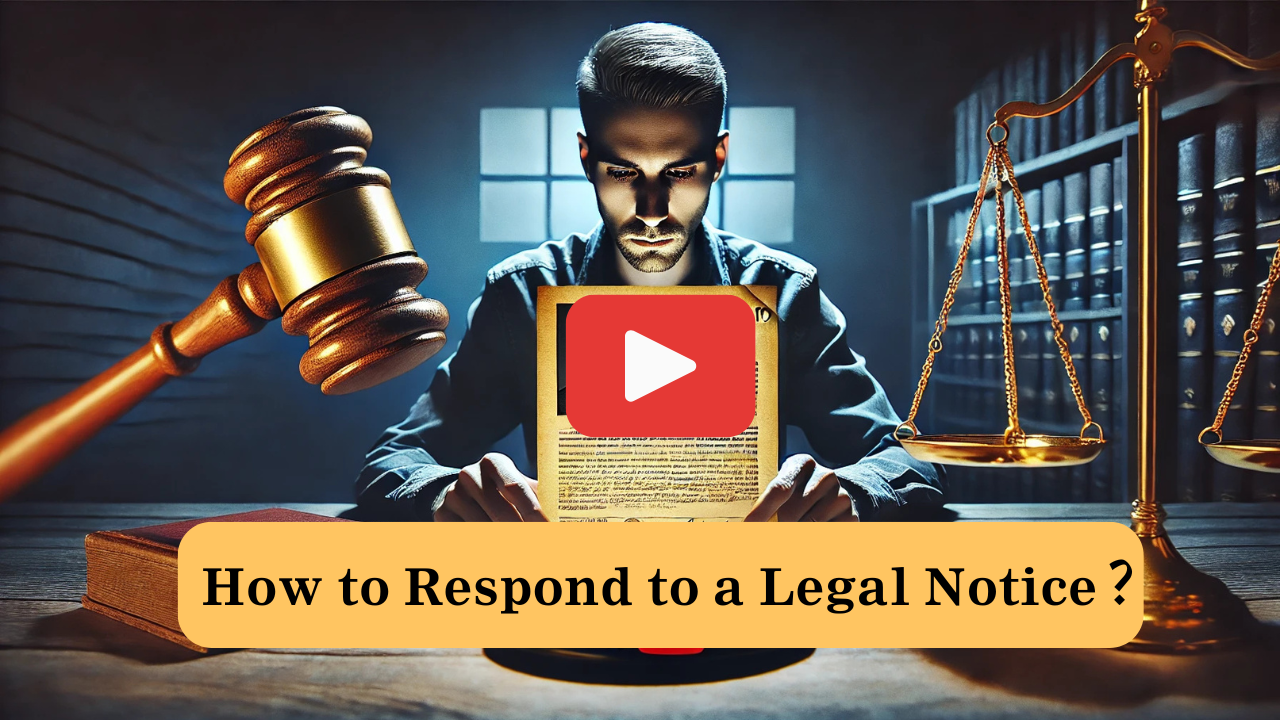How to Respond to a Legal Notice?
Receiving a legal notice can be stressful and intimidating, especially if you are unfamiliar with legal procedures. However, responding to a legal notice appropriately is crucial to protect your rights and avoid potential legal consequences.
In this article, we will cover everything you need to know about what a legal notice is, why it is sent, how to respond effectively, and what steps you should take to avoid legal trouble.
1. What is a Legal Notice?
A legal notice is a formal written communication sent by an individual, company, or lawyer to another party to inform them of a legal grievance. It serves as a final warning before initiating legal action in court.
Legal notices are usually sent for:
- Breach of contract
- Unpaid debts or dues
- Property disputes
- Consumer complaints
- Defamation cases
- Employment disputes
Receiving a legal notice does not mean that you are guilty; it simply means that someone has a legal complaint against you.
2. What to Do After Receiving a Legal Notice?
If you receive a legal notice, follow these steps:
A. Read the Notice Carefully
- Go through the notice thoroughly to understand the claims and allegations.
- Check the sender’s details, date, and subject matter of the notice.
- Identify if the notice is related to civil, criminal, or corporate matters.
B. Do Not Ignore the Notice
- Ignoring a legal notice can worsen the situation and may lead to legal action.
- Responding on time shows that you are serious about resolving the matter.
C. Note the Deadline for Response
- Every legal notice has a response deadline, usually 15 to 30 days.
- Failing to respond within the timeframe may result in a court case against you.
D. Gather All Relevant Documents
- Collect contracts, emails, payment receipts, agreements, and other relevant documents that can support your defense.
- Any document related to the dispute will help you build a strong legal reply.
E. Contact a Lawyer
- If the notice is complex, it is advisable to consult a lawyer to draft an appropriate response.
- A lawyer can help you understand your legal rights and suggest the best course of action.
3. How to Respond to a Legal Notice?
A. Drafting the Response
Your response should include:
- Reference Number and Date – Mention the details of the received legal notice.
- Your Personal Information – Include your name, address, and contact details.
- Acknowledgment of the Notice – Confirm that you have received the legal notice.
- Response to the Allegations – Clearly state your defense or counterarguments.
- Supporting Documents – Attach any relevant documents to support your response.
- Request for Resolution – Offer a way to settle the matter amicably if possible.
- Signature and Contact Details – Sign the response and mention your contact information.
B. Sending the Response
- The reply should be printed on legal letterhead if prepared by a lawyer.
- Send the response via registered post, courier, or email to ensure proof of delivery.
- Keep a copy of the response and the acknowledgment receipt for your records.
4. Sample Format for Responding to a Legal Notice
[Your Name]
[Your Address]
[City, State, PIN Code]
[Your Email]
[Your Phone Number]
[Date]
To,
[Name of Sender]
[Sender's Address]
[City, State, PIN Code]
Subject: Response to Legal Notice Dated [Date of Notice]
Dear [Sender’s Name],
I am in receipt of the legal notice dated [date] sent by you regarding [mention subject matter]. I respectfully submit my response as follows:
- I acknowledge the receipt of the legal notice, but I deny the allegations mentioned in it.
- The claims made in the notice are incorrect and do not reflect the complete facts.
- I have attached relevant documents supporting my stance on the matter.
- I am open to resolving the matter amicably through discussion.
If further legal action is taken, I will take necessary steps to protect my legal rights.
Sincerely,
[Your Name]
5. What Happens If You Do Not Respond to a Legal Notice?
If you ignore a legal notice, the sender may:
- File a lawsuit against you in court.
- Claim that you admitted guilt by not responding.
- Demand a higher compensation due to lack of response.
Ignoring a legal notice may weaken your position in court. Hence, it is always recommended to respond within the given timeframe.
6. Can You Challenge a Legal Notice?
Yes, you can challenge a legal notice if the claims are false.
- You can deny the allegations with strong evidence.
- If the notice is misleading or incorrect, you can file a counter legal notice.
- If you believe the notice is harassment, you can take legal action against the sender.
7. How to Avoid Receiving Legal Notices in the Future?
To reduce the chances of receiving legal notices:
- Always have written agreements for financial transactions, property deals, and business partnerships.
- Pay dues and loans on time to avoid disputes.
- Resolve conflicts amicably before they escalate to legal action.
- Maintain records of all transactions and communications.
Conclusion: Responding to a Legal Notice the Right Way
Receiving a legal notice is not the end of the world. A well-drafted response can help resolve the dispute without legal complications.
- Read the notice carefully and do not panic.
- Consult a lawyer if the matter is serious.
- Respond within the deadline with proper supporting documents.
- Consider out-of-court settlements to avoid lengthy legal battles.
A timely and well-structured response can help you avoid unnecessary legal trouble.

